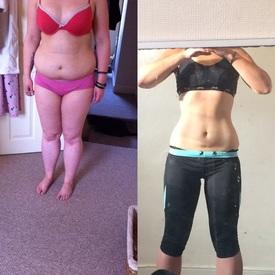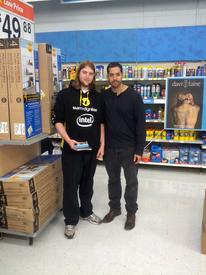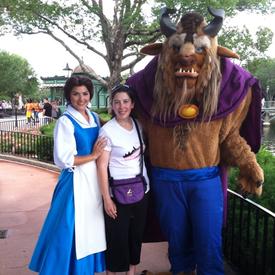Do I need to eat after I workout?
Options

PaperThinLips
Posts: 79 Member
I usually workout after school at around 1230 or one
but I eat lunch before hand so i have enough energy to do it
(last time i would have ate would have been breakfast between 730 and eight)
and I heard you have to eat something w/ protein after you workout to build muscle and recover
but I would have just consumed lunch!!
but I eat lunch before hand so i have enough energy to do it
(last time i would have ate would have been breakfast between 730 and eight)
and I heard you have to eat something w/ protein after you workout to build muscle and recover
but I would have just consumed lunch!!
0
Replies
-
You don't have to. If you're hungry or you feel dizzy/out of it, you might need to have something to get your blood sugar up. However, if that's not the case, there's no need to eat right afterward.0
-
Doesn't matter when you eat, just that you're meeting your nutritional needs day after day, week after week.0
-
There's no magic window of opportunity you're going to miss out on. As long as you eat some some protein within 24 hours you're fine.0
-
I always eat after I work out. Then again I work out usually before dinner time and come home @ ~6:30/7PM
Also, I was told it was very important, if trying to build muscle, to eat something with protein after lifting so as not to inadvertently break down the muscle you already have in an attempt to fuel your body. So I always have a protein drink after my weights class.0 -
drink protein shakes!!
 Very good for you!! and drink lots of water! 0
Very good for you!! and drink lots of water! 0 -
DEAR GOD YES. If you don't want your muscle tissue to break down, anyways.
Your body NEEDS protein and NEEDS to replace carbohydrates ASAP. It even needs sugar (healthy sugar, i.e., natural sugar). A great post-workout snack would be a glass of skim milk and an orange/apple/cup of raspberries/etc. Or if you don't drink milk, a can of tuna (about 100 grams) would be adequate.0 -
^^^^^There's no magic window of opportunity you're going to miss out on. As long as you eat some some protein within 24 hours you're fine.The postexercise "anabolic window" is a highly misused & abused concept. Preworkout nutrition all but cancels the urgency, unless you're an endurance athlete with multiple glycogen-depleting events in a single day. Getting down to brass tacks, a relatively recent study (Power et al. 2009) showed that a 45g dose of whey protein isolate takes appx 50 minutes to cause blood AA levels to peak. Resulting insulin levels, which peaked at 40 minutes after ingestion, remained at elevations known to max out the inhibition of muscle protein breakdown (15-30 mU/L) for 120 minutes after ingestion. This dose takes 3 hours for insulin & AA levels to return to baseline from the point of ingestion. The inclusion of carbs to this dose would cause AA & insulin levels to peak higher & stay elevated above baseline even longer.
So much for the anabolic peephole & the urgency to down AAs during your weight training workout; they are already seeping into circulation (& will continue to do so after your training bout is done). Even in the event that a preworkout meal is skipped, the anabolic effect of the postworkout meal is increased as a supercompensatory response (Deldicque et al, 2010). Moving on, another recent study (Staples et al, 2010) found that a substantial dose of carbohydrate (50g maltodextrin) added to 25g whey protein was unable to further increase postexercise net muscle protein balance compared to the protein dose without carbs. Again, this is not to say that adding carbs at this point is counterproductive, but it certainly doesn't support the idea that you must get your lightning-fast postexercise carb orgy for optimal results.
To add to this... Why has the majority of longer-term research failed to show any meaningful differences in nutrient timing relative to the resistance training bout? It's likely because the body is smarter than we give it credit for. Most people don't know that as a result of a single training bout, the receptivity of muscle to protein dosing can persist for at least 24 hours: http://www.ncbi.nlm.nih.gov/pubmed/21289204
Here's what you're not seeming to grasp: the "windows" for taking advantage of nutrient timing are not little peepholes. They're more like bay windows of a mansion. You're ignoring just how long the anabolic effects are of a typical mixed meal. Depending on the size of a meal, it takes a good 1-2 hours for circulating substrate levels to peak, and it takes a good 3-6 hours (or more) for everythng to drop back down to baseline.
You're also ignoring the fact that the anabolic effects of a meal are maxed out at much lower levels than typical meals drive insulin & amino acids up to. Furthermore, you're also ignoring the body's ability of anabolic (& fat-oxidative) supercompensation when forced to work in the absence of fuels. So, metaphorically speaking, our physiology basically has the universe mapped out and you're thinking it needs to be taught addition & subtraction.0 -
I either eat a protein-rich meal or drink a protein shake after I work out. I don't usually eat a whole meal before I work out though, just a banana or a protein shake or something small about an hour before. My tummy hurts if I eat too much before a workout.0
-
^^^^^There's no magic window of opportunity you're going to miss out on. As long as you eat some some protein within 24 hours you're fine.The postexercise "anabolic window" is a highly misused & abused concept. Preworkout nutrition all but cancels the urgency, unless you're an endurance athlete with multiple glycogen-depleting events in a single day. Getting down to brass tacks, a relatively recent study (Power et al. 2009) showed that a 45g dose of whey protein isolate takes appx 50 minutes to cause blood AA levels to peak. Resulting insulin levels, which peaked at 40 minutes after ingestion, remained at elevations known to max out the inhibition of muscle protein breakdown (15-30 mU/L) for 120 minutes after ingestion. This dose takes 3 hours for insulin & AA levels to return to baseline from the point of ingestion. The inclusion of carbs to this dose would cause AA & insulin levels to peak higher & stay elevated above baseline even longer.
So much for the anabolic peephole & the urgency to down AAs during your weight training workout; they are already seeping into circulation (& will continue to do so after your training bout is done). Even in the event that a preworkout meal is skipped, the anabolic effect of the postworkout meal is increased as a supercompensatory response (Deldicque et al, 2010). Moving on, another recent study (Staples et al, 2010) found that a substantial dose of carbohydrate (50g maltodextrin) added to 25g whey protein was unable to further increase postexercise net muscle protein balance compared to the protein dose without carbs. Again, this is not to say that adding carbs at this point is counterproductive, but it certainly doesn't support the idea that you must get your lightning-fast postexercise carb orgy for optimal results.
To add to this... Why has the majority of longer-term research failed to show any meaningful differences in nutrient timing relative to the resistance training bout? It's likely because the body is smarter than we give it credit for. Most people don't know that as a result of a single training bout, the receptivity of muscle to protein dosing can persist for at least 24 hours: http://www.ncbi.nlm.nih.gov/pubmed/21289204
Here's what you're not seeming to grasp: the "windows" for taking advantage of nutrient timing are not little peepholes. They're more like bay windows of a mansion. You're ignoring just how long the anabolic effects are of a typical mixed meal. Depending on the size of a meal, it takes a good 1-2 hours for circulating substrate levels to peak, and it takes a good 3-6 hours (or more) for everythng to drop back down to baseline.
You're also ignoring the fact that the anabolic effects of a meal are maxed out at much lower levels than typical meals drive insulin & amino acids up to. Furthermore, you're also ignoring the body's ability of anabolic (& fat-oxidative) supercompensation when forced to work in the absence of fuels. So, metaphorically speaking, our physiology basically has the universe mapped out and you're thinking it needs to be taught addition & subtraction.
Whoa! I consider myself a pretty sharp tack, but could someone translate that into "Fitness for Dummies" language for me? It sounds like it could be really fascinating, if I could only understand it, lol.0 -
I find I need to refuel my body after I workout do that would mean either breakfast if I workout in the morning or tea if I workout after work, sometimes I workout on the weekend in the day time so after that I will probably have something small like a piece of fruit or even cereal for lunch. So yea I always eat after my workout!!0
-
I read somewhere (can't remember...maybe Jillian Micheals??? But don't quote me) that you should have some kind of protein within 30 minutes after working out. It doesn't have to be a lot. I might have a protein bar...but I might eat something as small as the Old Wisconsin Turkey Stick (only 70 calories but yet very filling). But it doesn't have to be an entire meal.0
-
^^^^^There's no magic window of opportunity you're going to miss out on. As long as you eat some some protein within 24 hours you're fine.The postexercise "anabolic window" is a highly misused & abused concept. Preworkout nutrition all but cancels the urgency, unless you're an endurance athlete with multiple glycogen-depleting events in a single day. Getting down to brass tacks, a relatively recent study (Power et al. 2009) showed that a 45g dose of whey protein isolate takes appx 50 minutes to cause blood AA levels to peak. Resulting insulin levels, which peaked at 40 minutes after ingestion, remained at elevations known to max out the inhibition of muscle protein breakdown (15-30 mU/L) for 120 minutes after ingestion. This dose takes 3 hours for insulin & AA levels to return to baseline from the point of ingestion. The inclusion of carbs to this dose would cause AA & insulin levels to peak higher & stay elevated above baseline even longer.
So much for the anabolic peephole & the urgency to down AAs during your weight training workout; they are already seeping into circulation (& will continue to do so after your training bout is done). Even in the event that a preworkout meal is skipped, the anabolic effect of the postworkout meal is increased as a supercompensatory response (Deldicque et al, 2010). Moving on, another recent study (Staples et al, 2010) found that a substantial dose of carbohydrate (50g maltodextrin) added to 25g whey protein was unable to further increase postexercise net muscle protein balance compared to the protein dose without carbs. Again, this is not to say that adding carbs at this point is counterproductive, but it certainly doesn't support the idea that you must get your lightning-fast postexercise carb orgy for optimal results.
To add to this... Why has the majority of longer-term research failed to show any meaningful differences in nutrient timing relative to the resistance training bout? It's likely because the body is smarter than we give it credit for. Most people don't know that as a result of a single training bout, the receptivity of muscle to protein dosing can persist for at least 24 hours: http://www.ncbi.nlm.nih.gov/pubmed/21289204
Here's what you're not seeming to grasp: the "windows" for taking advantage of nutrient timing are not little peepholes. They're more like bay windows of a mansion. You're ignoring just how long the anabolic effects are of a typical mixed meal. Depending on the size of a meal, it takes a good 1-2 hours for circulating substrate levels to peak, and it takes a good 3-6 hours (or more) for everythng to drop back down to baseline.
You're also ignoring the fact that the anabolic effects of a meal are maxed out at much lower levels than typical meals drive insulin & amino acids up to. Furthermore, you're also ignoring the body's ability of anabolic (& fat-oxidative) supercompensation when forced to work in the absence of fuels. So, metaphorically speaking, our physiology basically has the universe mapped out and you're thinking it needs to be taught addition & subtraction.
Whoa! I consider myself a pretty sharp tack, but could someone translate that into "Fitness for Dummies" language for me? It sounds like it could be really fascinating, if I could only understand it, lol.
Fitness for dummies translation: It doesn't matter when you eat, as long as you hit all of your nutrition goals for the day.
Or, as Alan Aragon puts it:The Primary Laws of Nutrient Timing
The First Law of Nutrient Timing is: hitting your daily macronutrient targets is FAR more important than nutrient timing.
The Second Law of Nutrient Timing is: hitting your daily macronutrient targets is FAR more important than nutrient timing.0 -
Whoa! I consider myself a pretty sharp tack, but could someone translate that into "Fitness for Dummies" language for me? It sounds like it could be really fascinating, if I could only understand it, lol.
The "window" everyone talks about is a very very large one, there is no urgency to eat right after a workout. Pre-workout nutrition has also been shown to be more effective, but even this is not really important if you are not an athlete training very hard, more than once a day (in which case, such things might be of relevance since you want some fuel for the second workout)
The Whey protein (or even the slightly faster version, Whey Isolate) that everyone takes religiously right as the weights hit the ground take as much as 50 minutes to enter the blood stream, so it just shows that this whole precision intake thing is blown out of proportion.
Read the studies if you want to learn more, it's really quite fascinating.0 -
Putting the science aside for a moment and listening to my body, if I finish a 1K plus calorie burn and don't eat, I start feeling nauseous and very lethargic. Listening to your body is my advice in this argument. If you see a downward trend in the way you respond to tough workouts, eat as a rule. If it doesn't bother you to go for a while, then eat when you want.0
-
This
^^^^^There's no magic window of opportunity you're going to miss out on. As long as you eat some some protein within 24 hours you're fine.The postexercise "anabolic window" is a highly misused & abused concept. Preworkout nutrition all but cancels the urgency, unless you're an endurance athlete with multiple glycogen-depleting events in a single day. Getting down to brass tacks, a relatively recent study (Power et al. 2009) showed that a 45g dose of whey protein isolate takes appx 50 minutes to cause blood AA levels to peak. Resulting insulin levels, which peaked at 40 minutes after ingestion, remained at elevations known to max out the inhibition of muscle protein breakdown (15-30 mU/L) for 120 minutes after ingestion. This dose takes 3 hours for insulin & AA levels to return to baseline from the point of ingestion. The inclusion of carbs to this dose would cause AA & insulin levels to peak higher & stay elevated above baseline even longer.
So much for the anabolic peephole & the urgency to down AAs during your weight training workout; they are already seeping into circulation (& will continue to do so after your training bout is done). Even in the event that a preworkout meal is skipped, the anabolic effect of the postworkout meal is increased as a supercompensatory response (Deldicque et al, 2010). Moving on, another recent study (Staples et al, 2010) found that a substantial dose of carbohydrate (50g maltodextrin) added to 25g whey protein was unable to further increase postexercise net muscle protein balance compared to the protein dose without carbs. Again, this is not to say that adding carbs at this point is counterproductive, but it certainly doesn't support the idea that you must get your lightning-fast postexercise carb orgy for optimal results.
To add to this... Why has the majority of longer-term research failed to show any meaningful differences in nutrient timing relative to the resistance training bout? It's likely because the body is smarter than we give it credit for. Most people don't know that as a result of a single training bout, the receptivity of muscle to protein dosing can persist for at least 24 hours: http://www.ncbi.nlm.nih.gov/pubmed/21289204
Here's what you're not seeming to grasp: the "windows" for taking advantage of nutrient timing are not little peepholes. They're more like bay windows of a mansion. You're ignoring just how long the anabolic effects are of a typical mixed meal. Depending on the size of a meal, it takes a good 1-2 hours for circulating substrate levels to peak, and it takes a good 3-6 hours (or more) for everythng to drop back down to baseline.
You're also ignoring the fact that the anabolic effects of a meal are maxed out at much lower levels than typical meals drive insulin & amino acids up to. Furthermore, you're also ignoring the body's ability of anabolic (& fat-oxidative) supercompensation when forced to work in the absence of fuels. So, metaphorically speaking, our physiology basically has the universe mapped out and you're thinking it needs to be taught addition & subtraction.0 -
I'm no sports nutritionist, but the only time I really eat after I exercise would be when I get back from a long run (running for 1:30 - 2 hours). Other than that, I usually don't worry about it.0
This discussion has been closed.
Categories
- All Categories
- 1.4M Health, Wellness and Goals
- 396.9K Introduce Yourself
- 44.2K Getting Started
- 260.9K Health and Weight Loss
- 176.3K Food and Nutrition
- 47.6K Recipes
- 232.8K Fitness and Exercise
- 452 Sleep, Mindfulness and Overall Wellness
- 6.5K Goal: Maintaining Weight
- 8.7K Goal: Gaining Weight and Body Building
- 153.3K Motivation and Support
- 8.3K Challenges
- 1.3K Debate Club
- 96.5K Chit-Chat
- 2.6K Fun and Games
- 4.5K MyFitnessPal Information
- 16 News and Announcements
- 18 MyFitnessPal Academy
- 1.4K Feature Suggestions and Ideas
- 3.1K MyFitnessPal Tech Support Questions












